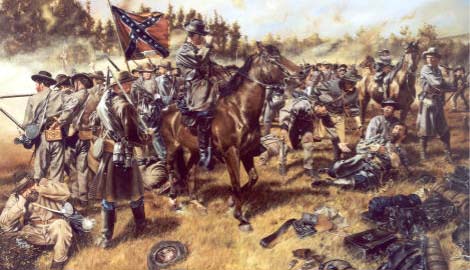The following letter was written by John M. Lovejoy. He enlisted in the army in August 1862 in Company G of the 121st New York Volunteer Infantry. He was only 19 years old and his first taste of battle came during the fight at Crampton's Gap. Fortunately, Lovejoy's regiment remained in reserve during the battle but, Lovejoy writes about what he witnessed as the 6th Corps attacked up the slopes of the mountain. He also writes, rather graphically, about what he witnessed as his regiment moved up to the Crampton's Gap to occupy the gap and bury the dead. Following the battle, he would serve as an orderly tending to wounded of both sides in Burkittsville. He would rise to the rank of Corporal before being mustered out with his company in June 1865.
Headquarters of the 121 Regt. NY Vol.
Battlefield near Burkittsville, Maryland
My dear Cousins and friends,
It is with strange feeling but yet a feeling of gratitude that I now attempt to write to you about one half hour ago, the 2nd lieutenant came in with letters for the company. On having heart leaped with joy when I heard my name called now I must write in short all that will interest you. One week ago yesterday we took up the lines of march to join the division. We joined Slocum's. We belong to [Franchot's] Reg., Bartlett's Brigade, Slocum's Division, Franklin's Corps. Yesterday morning (Sunday), we were near at three o'clock. At five, we were in line for march. We had not marched more than 2 1/2 miles when the booming of artillery told us that we were engaging the enemy about Harpers Ferry. We marched on til noon when we halted in a field in front of the Village of Jefferson. About [two] hours had passed in sight of artillery firing when were were ordered forward. We moved across the fields instead of roads and cornfields and ridges when we were halted in a ravine between the mountain and our batterys. Our men fired a gun to draw the [attention] of the rebels while were were moving down the gulf the rebels returned the fire. The shells falling over our heads about fifteen feet. I must confess that I dazed when the shells passed whistling like fury. When we got in the ravine, we found about five thousand men drawn up in line ready to march at a moments warning. About three o'clock, all the forces except out reg. were called upon to march to the field. We were held in reserve. Our boys marched boldly across the plain under such a volley of grape, canister, and shell. The hill the rebels held was as steep as that south of you house. The rebels had their batteries planted in a road out through the wood about half way up the hill. Our forces marched up to the face of the hill under the fire of their infantry and artillery when they returned a few rounds. When Gen. Slocum ordered to charge . . . they sent up such chants that they could be heard at a great distance. They charged on heeding not the fire of the rebels. The rebels stood their ground bravely until our forces got quite close to them when they turned and ran. I can tell you the way they skedaddled was a . . . . The pinch for me came next morning to see the dead and dying and wounded soldiers, the greater part of them shot through the head. I saw at least 100 dead rebels. In some places they lay so thick that one could not move without treading on them. You can't imagine the [sounds] of the wounded and dying with dead and dying all around you. I'm sure as for one, I should rather be killed out right. I saw [a] poor fellow killed who had been shot through the leg. He had rolled up his pants, put tobacco on the wound, and had kept it dry when another bullet took him through the head scattering his brains in all directions. I saw one poor rebel die. At times he prayed, at times he saw. He cursed the yankee who had given him his death wound. The sight of the field after the battle is more horrible then the battle itself but, enough of this. The loss of the rebels were three hundred killed and wounded to seven hundred prisoners. Our loss was about one hundred killed and wounded and no prisoners. One word from your friend to David, Jonathan should enlist, stay at home . . . and to when you can enjoy yourself. Any man can be patriotic at home but when his belly is empty, his patriotism is all gone. Some times on our march, we did not draw rations. . . . If my life is spared, I shall be with you by another fall. Enjoy yourself as well as you can, but I must close. Good bye from you cousin and friend John M. Lovejoy.

This was a very interesting page. The John M Lovejoy that wrote the letter is my Great Great Grandpa. It was interesting to read because it's the only letter I've ever seen where he actually described vividly what he'd seen in the war. Where did you find this letter? Thank you for posting it!!
ReplyDeleteDonna Brodie Hatch
Ms. Batch,
DeleteThe letter when I published this post was in private hands and was given to the park I worked at so it could be transcribed before being returned. Thank you for reading the page.